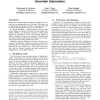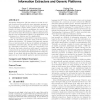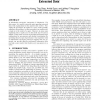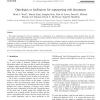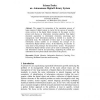126
Voted
PVLDB
2010
15 years 1 months ago
2010
Mashups are situational applications that join multiple sources to better meet the information needs of Web users. Web sources can be huge databases behind query interfaces, which...
129
click to vote
CIKM
2010
Springer
15 years 1 months ago
2010
Springer
Information Extraction (IE) has existed as a field for several decades and has produced some impressive systems in the recent past. Despite its success, widespread usage and comm...
122
click to vote
PVLDB
2008
15 years 2 months ago
2008
In information extraction, uncertainty is ubiquitous. For this reason, it is useful to provide users querying extracted data with explanations for the answers they receive. Provid...
121
click to vote
JBI
2002
15 years 2 months ago
2002
Information extraction is the process of scanning text for information relevant to some interest, including extracting entities, relations, and events. It requires deeper analysis...
141
click to vote
JBI
2002
15 years 2 months ago
2002
i As the pace of biological research accelerates, biologists are becoming increasingly reliant on computers to manage the information explosion. Biologists communicate their resea...
124
click to vote
COLING
2002
15 years 2 months ago
2002
Information extraction (IE) systems are costly to build because they require development texts, parsing tools, and specialized dictionaries for each application domain and each na...
155
click to vote
BMCBI
2005
15 years 2 months ago
2005
Background: Automated information extraction from biomedical literature is important because a vast amount of biomedical literature has been published. Recognition of the biomedic...
IJMMS
2007
15 years 2 months ago
2007
This paper investigates the role of ontologies as a central part of an architecture to repurpose existing material from the web. A prototype system called ArtEquAKT is presented, ...
104
click to vote
OIR
2008
15 years 2 months ago
2008
The support for automation of the annotation process of large corpora of digital content is crucial for the success of semanticaware services in the digital library domain. In this...
109
click to vote
JUCS
2008
15 years 2 months ago
2008
Abstract: As web sites are getting more complicated, the construction of web information extraction systems becomes more troublesome and time-consuming. A common theme is the diffi...
